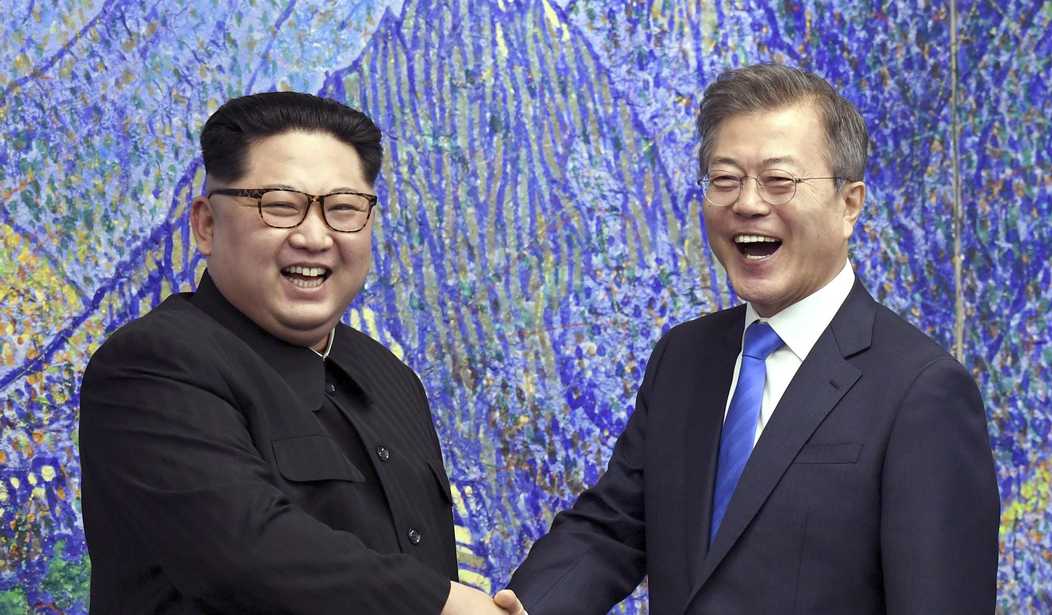The timing of the evidence suggests that this challenge to American and global power might just be a coincidence. If not, Kim Jong-un has impeccable timing. At the same time Joe Biden insisted that he couldn’t order any more of America’s sons and daughters to die for Afghans, the North Korean dictator apparently wants to see if Biden feels the same way about South Koreans.
And even if this is coincidental to that declaration from Biden, it won’t be the last time our geopolitical foes start testing those boundaries:
North Korea appears to have restarted operations at a power plant capable of producing plutonium for nuclear weapons, according to the United Nations’ nuclear watchdog.
The International Atomic Energy Agency said that clues, such as the discharge of cooling water, observed in early July indicated the plant is active. No such evidence had been observed since December 2018, the IAEA said.
The IAEA said the findings, published Friday in an annual report on Pyongyang’s nuclear program, were “deeply troubling” and “a cause for serious concern.”
“The continuation of the DPRK’s nuclear program is a clear violation of relevant UN Security Council resolutions and is deeply regrettable,” the report added, referring to North Korea by its official acronym, The Democratic People’s Republic of Korea (DPRK).
The power plant doesn’t get identified until the sixth paragraph, but it’s the well-known reactor at Yongbyon. The Yongbyon complex has long been at the center of US-DPRK tensions, with Kim and his father using it as a bargaining chip at times while excluding it from IAEA inspection for more than a decade. Kim had taken it off line during his pas de deux with Donald Trump, and it appeared that he might have lost interest in nuclear provocation for a while.
Suddenly, Kim seems much more interested, and the Washington Post adds this to Joe Biden’s headaches:
The finding adds another challenge to the Biden administration’s goal of denuclearizing North Korea. The apparent restarting of the reactor is notable given that the United States’ negotiations with Pyongyang over its nuclear program have stalled since 2019, when North Korean leader Kim Jong Un offered to dismantle the sprawling Yongbyon complex — but not other nuclear and missile sites — in exchange for extensive sanctions relief. …
Leading up to the July restart of the 5-megawatt reactor, a steam plant at a radiochemical laboratory was in operation for five months beginning in mid-February, according to the report. This stood out because the duration is consistent with the time required to process a full batch of fuel from the reactor, and much longer than is needed for maintenance or waste management, the report said.
Another point for coincidence is that North Korea has a new food crisis, or so it appears recently. In fact, it’s bad enough that Kim himself has acknowledged in June the impact of a bad year of food production, and prices have doubled for staples such as cabbage, National Interest’s Stephen Silver noted last week. Also last week, state broadcasting began warning people about overeating, a rare problem in a nation that struggles to feed itself:
A North Korean cartoon that aired on state television last week appears to warn kids against obesity and overeating, amid a national food shortage – and as Kim Jong Un himself reportedly shed dozens of pounds.
In a clip from the cartoon, reported Seoul-based journalist Chad O’Carroll from news and analysis site NKNews, two girls are walking on city streets during the winter. One of them chides her chubbier friend for wanting to take the bus home despite her weight, and tells her she should walk instead.
NKN reporter Colin Zwirko suggested that the propaganda might be aimed at demonstrating prosperity. It might also be aimed at preserving short food supplies and making starvation patriotic.
If there really is a food crisis, however, it would also explain the reopening on Yongbyon. Kim’s father Kim Jong-Il often used nuclear brinksmanship to play hardball on food shipments and oil concessions from the US and Japan. It worked, too, at least to some extent. If this food crisis is bad enough, Kim might have just reached into Dad’s playbook to get some breathing room on the kind of unrest starvation provokes. That would have been the case even if we’d never changed our Afghanistan position an iota.
Food crisis or coincidence aside, a challenge was inevitable from Kim after the debacle in Afghanistan. Our collapse and the abandonment of our allies practically begs bad actors to pressure our allies and convince them that we’ll run away from them, too. And one has to wonder what the South Koreans must be thinking after watching the US not just abandon its allies in Afghanistan but our own citizens as well — to a group with a much smaller army than Kim’s.








